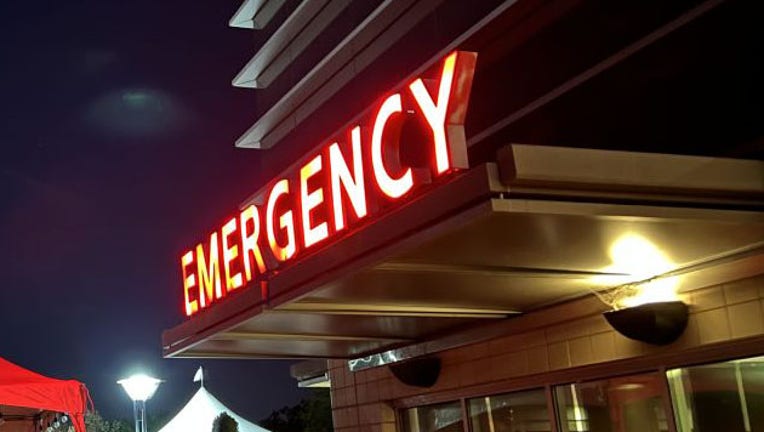Recreational marijuana use linked to increased chance of ER, hospitalization, study finds

FILE IMAGE - Night view of an illuminated red sign for the emergency department or emergency room at a hospital in Walnut Creek, California, on March 15, 2022. (Photo by Gado/Getty Images)
Recreational marijuana use was linked to an increased risk of a visit to the emergency room and being admitted to the hospital for any reason, a recently-published observational study suggests.
The research, published on June 27 in the journal BMJ Open Respiratory Research, states that marijuana use was associated with 22% greater odds of an emergency room visit or hospital admission for any cause.
Acute trauma, which is something that occurs due to a single event such as a car crash, was the most common cause at 15.1%, followed by respiratory health reasons (14.2%) and gastrointestinal issues (13.3%).
Study uses survey, health record data from Ontario residents
The Canadian researchers linked national health survey and health records data for more than 35,000 residents of Ontario who were between the ages of 12 to 65, spanning the period between January 2009 and December 2015. They noted how Ontario is Canada’s most populous province with approximately 14.7 million people and is also culturally diverse.
Of those people, nearly 4,100 said they had used marijuana within the previous 12 months.
The researchers also controlled for 31 factors, which included several physical and mental health conditions, previous emergency room visits or hospital admissions for respiratory health issues, tobacco, alcohol, and other substance use and misuse.
While marijuana use was linked to a 22% greater chance of visiting the hospital — the overall risk of death did not differ significantly between the two groups, according to the study.
Lead researcher Dr. Nicholas Vozoris, an assistant professor of respirology at the University of Toronto, said there are several explanations for why cannabis use might lead to hospitalizations.
"Some of that might be increased motor vehicle accidents related to cannabis-related drowsiness or altered level of consciousness," Vozoris told HealthDay. "Some of that might be falls and fractures from, again, a cannabis-related altered level of consciousness or drowsiness. Some of it might be the cannabis making someone anxious or mentally unstable and then getting into physical altercations or injuring themselves."
Marijuana is the most commonly used federally illegal drug in the United States, with an estimated 48.2 million people using it in 2019, according to the U.S. Centers for Disease Control and Prevention. It notes how its use may have a wide range of health effects on the body and brain, including harm to lung tissues and damage to small blood vessels when smoked.
‘Further research needed,’ study authors conclude
The researchers acknowledged that they weren’t able to differentiate between medical and recreational marijuana use, potency and quantity, or whether cannabis was eaten or smoked.
It was also an observational study, meaning it can’t provide evidence of cause and effect, just evidence of a potential link that more research could explore further.
But as more countries move to legalize the recreational use of marijuana, the findings prompted the Canadian researchers to call for curbing such use worldwide — saying it’s not as harmless as some people might think. At least 19 U.S. states and Washington, D.C. have passed laws to regulate recreational cannabis use.
"Further research is needed to confirm our findings, but our results suggest that cannabis use is associated with increased risk for serious adverse health events, and therefore, its recreational consumption in the general population should be discouraged," the researchers concluded.
The study was funded by the Ontario Lung Association, the Ontario Ministry of Health, and the Ministry of Long-Term Care.
Leaders of NORML, a group advocating for reform of U.S. marijuana laws, called the results from the study "inconsistent" with other prior studies that investigated a potential relationship between cannabis use and ER visits.
One study, published in 2011 in the American Journal of Emergency Medicine, analyzed drug-related emergency room visits among lifetime users of illicit drugs and found that those who reported using marijuana were the least likely to have reported such a visit. Another study, published in 2021 in BMC Emergency Medicine, found that Canada’s legalization of adult-use marijuana was not associated with a change in the rate of cannabis-related emergency room visits.
In an email to FOX Television Stations, NORML's political director Morgan Fox said that while the recent study’s authors adjusted for a number of additional variables, "there are certainly myriad others which were unaccounted for and which could have a major association with increased likelihood of ER visits."
"Furthermore, the continued societal stigma around cannabis leads to people under-reporting past use in medical settings," Fox said.
There has been some previous research linking marijuana use and physical and/or emotional injury, particularly among younger people.
One 2021 study found heavy use of marijuana by teenagers and young adults with mood disorders, such as depression and bipolar disorder, was associated with an increased risk of self-harm, suicide attempts, and death. Another 2021 study found that cannabis legalization in Colorado was linked to an increase in vomiting-related emergency department visits.
This story was reported from Cincinnati.


